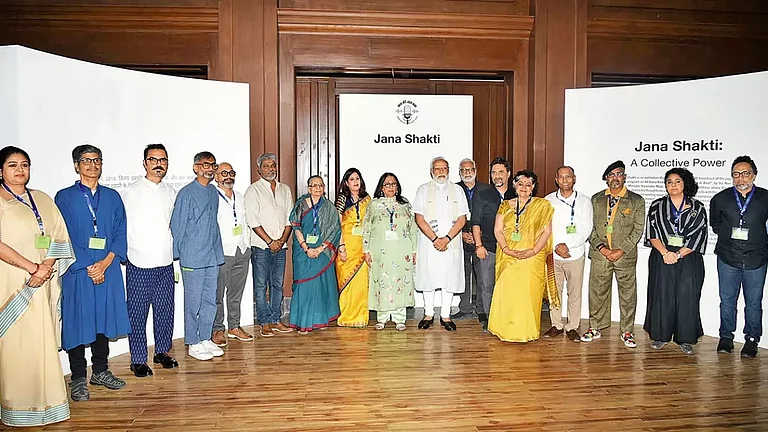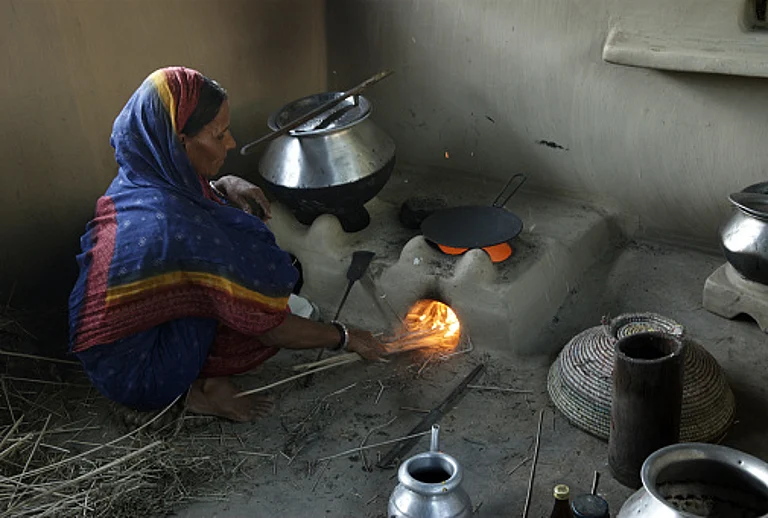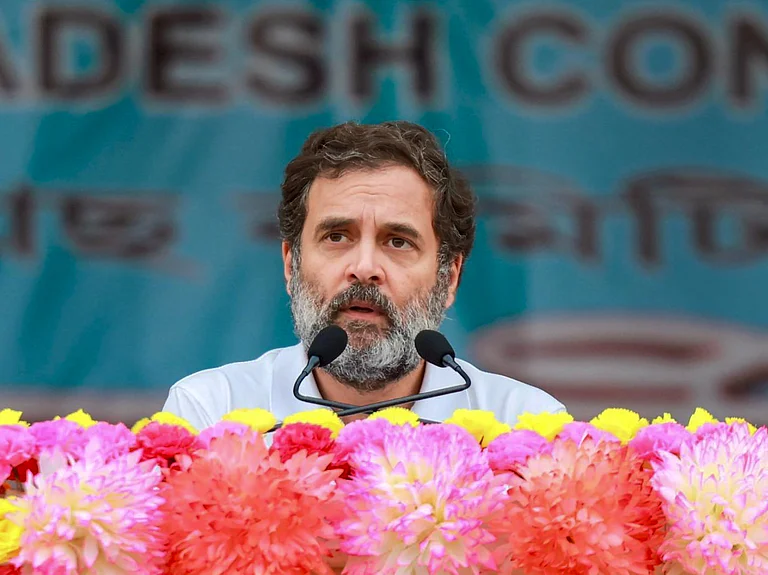In the heart of Bihar, democracy is not a distant idea. It is lived daily by women whose names will never make headlines—women who vote, organise and survive with quiet urgency. Across caste, religion and location, their lives reveal what participation looks like—whether the state is absent or present—and even when the most fragile thing they hold is hope.
Women Who Govern
In Nadi village near Darbhanga town, Rashmi Chaudhary sits at the front of every panchayat meeting. Her husband, Naushad, once active in grassroots politics in Delhi, now supports her work as sarpanch. Rashmi won on a reserved Scheduled Caste seat, and she is married to a Muslim man. “People wanted someone who could get things done,” she says.
With no party backing and limited funds, she pushes ahead—on roads, water and education. Caste and religion remain present in the political air, but she calls for unity. “Sab milke chalein toh kuch badal sakta hai—only if we unite can things change for the better.”
It is Rashmi who holds formal office now, not her husband, who had been an activist for Aam Aadmi Party in Delhi. She attends meetings, follows up on complaints and tries to fix the school’s problems and get work sanctioned under MGNREGA. “Funds are always a problem,” she says. “But I go wherever I’m called.” When asked what kind of politics she believes in, she says, “Unity. Not caste or religion. What good has that ever done us?” Her power is fiesty, her obstacles many—but the space she occupies is real.
In another part of Darbhanga, Reshma Ara, elected mukhiya at age 30, four years ago, is a visible figure of authority. Her presence disrupts stereotypes—a veiled woman asserting accountability, demanding updates, standing firm.
“Main padhi-likhi hoon. Log sunte hain—I am educated, people believe in me,” she says. People of Gonoun panchayat respond because she shows up, listens and acts. Faith and governance need not be in conflict.
Her leadership, though marked by challenges—especially in a state where women in politics are often undermined and funds are always in short supply—becomes an inspiring example of how women can navigate traditional roles and still be changemakers.
Anamika Jha, a researcher and development practitioner from Bihar, points out that many outside observers fail to register this shift. “We only look for the visible symbols—whether a woman is wearing a ghunghat, whether she travels alone. But those aren’t the only markers of change. Women have entered the political sphere in Bihar. There is a whole generation now that has seen that. It has shaped their understanding of what is possible.”
That sense of possibility shows up in different forms. A sarpanch from a conservative Hindu household, Reema Kumari hardly gets to play her role as elected representative and shoulder her responsibilities in Pohaddi Bela, a sprawling village in Darbhanga. Her husband and brother-in-law conduct all her affairs. She rarely does the talking—and then slowly, cautiously, with an authority she’s yet to learn to wield. “I’d love to contest again—if I’m allowed!” is all she says.
As Kamayani Jha, who launched the grassroots organisation Jan Jagran Shakti Sakiti (JJSS) in Araria notes, many women who step into public roles do so at a cost. In households where women go out to work—like ASHAs or Anganwadi workers—girls are often pulled out of school to take on chores at home. “There’s a trade-off. Change is happening, but it’s layered,” she says. And every new problem demands a solution.
Women Who Cook
Guchiya Devi of Pohaddi Bela village in Darbhanga district wakes before dawn to feed 250 schoolchildren. A widow from a backward caste, she earns Rs 1,650 a month—though payments are delayed for months. Her ramshackle home is crumbling, her eyes tired, her body emaciated. “Aathrah hazaar mile toh zindagi sudhar jaaye,” she says—if she were paid Rs 18,000, life would improve. She is not alone.
Amala Devi, a Dalit woman from the Musahar community and Guchiya’s neighbour, says she starts her day at 4 am to manage housework before heading to the school kitchen to cook. Her husband migrates for work, often stranded between trains and poverty. “Kam se kam mazdoori mile,” she pleads—just give us minimum wage to live on respectably.
Bhular Devi and Putul Devi carry sacks of vegetables on foot, buy ingredients with their own money, and wait to be reimbursed. They are not salaried. They are not secure. Yet they consider themselves “sarkari”—government—workers because they cook in government schools. The dignity of that title matters. It is a big reason why the job of a rasoiya appeals to the cooks despite the poor pay.
Geeta Devi, another cook, refuses to quit despite the difficult circumstances of work—soot and smoke cloud up and fill the school’s kitchen on a daily basis. But what if her husband, who works in Kolkata most of the year, were to increase his income by what she earns in a month? Would she then quit? “Kaam kartey rahengey. Das mahine tak paise nahi maangna padta,” she says—I will not stop working. For ten months a year, she doesn’t have to ask her husband for money for every little expense. That, for her, is independence. Hard won, but real.
Besides, they have all heard that the government is under pressure from the Opposition to increase their earnings. In the tussle before the Assembly election, they hope to get a clear assurance. The irony is they’re women who feed the children of the state, but the state barely feeds them. Still, they stay. Work, even when poorly paid, is power—and they understand it.
Women, And Some Men, Who Wait
In Rishidev Naya Tola, a resettled Musahar hamlet in Forbesganj, the houses of all the residents are made of hope and ambition, for brick and mortar are in very short supply here. Joganand Das, old and nearly blind, still tends to local farmers’ fields, although he has already spent his youth doing back-breaking construction and farm work in Kashmir, Punjab and Haryana.
Ranjana, a young mother, says her children can’t attend school—the Aadhaar cards never came. Her husband is away, doing construction work in Punjab. Work under MGNREGS? “Do saal se kuchh nahi mila—it’s two years since I got that work,” she says. Surendra, another resident, took a Rs 10,000 loan to pay off another loan. Mukesh’s family is deep in informal debt. Shiv Nandan says, “Idhar ke logon ne sab party ko vote diya hai.” He lists RJD, JDU, BJP, LJP. None delivered. Here, a vote is not loyalty. It’s a rotating experiment in survival, both for the old men and the women—the mothers and wives of migrant workers—who have stayed on.
Politics here is both vital and irrelevant. No one forgets to vote. But no one expects much either. The state’s promises—100 days of work, fair wages, houses, electricity, papers—live alongside women-run homes, growing concerns about addiction among the youth, indebtedness, landlessness and caste hierarchy. Some of the houses are even locked and abandoned by residents who have run away after failing to repay their debts to private institutions. Others, like Manju, say, “Even if I have to sell all the rice stocked at my house, and go hungry, I’ll repay the loan amount, come what may.”
Yet, even here, the sense of resignation is not total. People talk. They argue. They remember who came, and who didn’t.
“No child from our Rishidev Tola goes to school. They usually don’t have Aadhaar cards, birth certificates or other documents,” Manju says. “Bribes demanded from us to secure any of these documents are beyond our reach,” she says.
At the end of it all, the story of the women voters of Bihar isn’t a single narrative. It’s a weave of memories, hopes and the strength to choose even when all options seem lacking.
Despite every disappointment—lack of jobs, broken promises, absent services—many in Naya Tola still say ‘Modi achcha kar raha hain.’ Shiv Nandan Rishidev, who recently took out a loan to buy a buffalo that hasn’t yet started giving milk, grins shyly. He’s referring to the construction of the Ram Mandir in Ayodhya. Why does he like it? He mutters, “Bhakti, pooja-paath ho raha hai.” Faith over food, some would say—but for others, hope is more complex than that.
Others are more ambivalent. “BJP is good and bad,” one resident offers. “They lie, but they also tell the truth.” Their votes swing not on ideology but on a patchwork of memory, trust and perceived delivery. They used to vote Congress, now it’s BJP. But if Congress comes again, they say they’ll vote for them too. The past isn’t rejected; it’s waiting.
The state schemes are often referred to by older names. Indira Awas remains the name of the Pradhan Mantri Awas Yojana for many. It’s not a dismissal of the current government, but a reminder that in villages like these, memory runs further than a news cycle. What matters is what was built, not who built it. That said, the sense of being forgotten is strong. One woman says angrily, “Those whose husbands earn Rs 30,000 a month can survive. We don’t even make Rs 4,000 here.” She has four daughters. “Naak mein dum,” she adds—they’re a constant worry. She’s also heard of a scheme called Chhat Vratti, but says her daughters aren’t receiving it. (This is likely a reference to the Mukhyamantri Kanya Utthan Yojana.)
The contradictions of loyalty run deep. The BJP is credited for providing free rice and security—desh surakshit hai, Lalita says. Others say that the party is “keeping out ghuspethi”—infiltrators. Yet, it’s also under this government that electricity failed and the community had to collect Rs 3,000 through chanda (donations) to repair the line themselves. They waited two weeks for help, then gave up.
Women Who Imagine
Close to the border of Araria and Purnia, an hour’s drive east of Naya Tola, a different kind of quiet revolution is unfolding—this one led by young women and men. Zubeida, 18, co-runs a youth club set up in 2022 by JJSS in Rampur Kodarkatti village. She studies economics and arts at Araria Millia College and is a confident presence in her village. Along with her neighbour Adil, a young activist, and other volunteers, she keeps the club running for about 15 to 25 children. They come to read, play, prepare for school—and, perhaps most importantly, to feel like someone is investing in their future.
The club is simple: carrom boards, a few books, a football, sometimes cricket. Most children are below Class 7. Older girls drop out when they hit puberty, often due to parental pressure, who consider the walk to school unsafe and improper.
Why does Zubeida keep doing this work? “Padhai, khelna, samajhna... kuch toh badlega,” she says, speaking softly. Education, play, awareness—something will change. She’s not naïve; she knows the limits. The club runs with no official support, just determination. Every month, two volunteers rotate in to keep the spirit alive and supplement the learning of those who attend. The politics in this region is different from Naya Tola, too. Here, the RJD and Congress still dominate state politics, and there’s very little sense of drift. Religious identity often drives political choices. “Dharam ya jati ke vishay se raajneeti dekha jaata hai—it is through the lens of religion and caste that people generally view politics,” says Adil.
This region is a hub of the outward migration of workers from Bihar to other states. It means that many of the households have only women, children and the old living in them. So, very often, women make the day-to-day decisions on their own, and some have sole authority to decide what happens—which relative to visit, which wedding to attend, which child must study until what class, and so on.
But the party lines are much more ambiguous than family lines. And the fuzziness filters down. Party lines blur. Voters are left wondering who stands with them and who merely shows up when the polls arrive. The Muslim residents worry about the rising polarised discourse. Yet the instinct to participate doesn’t die. Whether it’s voting or volunteering, women here show up, not because they believe the system works—but because they believe it might, if they keep pushing.
Shehnaz Khatoon, who is visiting her family in Araria from Delhi, where she lives with her husband and his parents, says she’s planning a smaller family than the ones she and her husband were raised in. She would have loved a small-time job, but her family wouldn’t approve. But when she decided that a small family would be easier to manage—and more affordable—her husband agreed. Zubeida’s education, though only till matriculation, sets her apart.
But Shehnaz’s distant relative, Mohammad Arman, 44, sees it differently. He’s a plumber working in Delhi and Noida high rises, with a crushing debt of Rs 60,000, which he must repay in 24 remaining instalments of Rs 3,200. His monthly income is roughly Rs 15,000, which supports him and his wife, who lives in Rampur Kodarkatti in Araria, raising their seven children. But he has no regrets—the loan was to purchase the land on which his family lives, so well worth it. But he also says that he’s the one who decides what happens at home—who can go where, when and for what purposes, for example. Everything is dictated by him over the phone from Delhi to his wife. She, though watching him speak from a distance, refuses to utter even a word.
Choosing Without Illusion
Across villages in Araria, Forbesganj and Darbhanga districts, the stories differ in detail but converge in essence. The state’s promises—school scholarships, 100 days of MGNREGS work, timely Aadhaar cards, dignified housing, fair wages—remain only partially fulfilled. Many are indebted to private lenders; many have children who cannot attend school for lack of papers or funds. Yet the emotional investment in democracy persists. Not as worship, but as negotiation.
At the end of it all, the story of the women voters of Bihar—of sarpanches and rasoiyas, wives of migrants and organisers—isn’t a single narrative. It’s a weave of memories, hopes and the strength to choose even when all options seem lacking. These women are not waiting for saviours. They are working, walking, doing—and always watching. Voting, for them, is not allegiance. It’s leverage.
MORE FROM THIS ISSUE
In Jungle Raj, 카지노’s August 1 issue, we explored why the Bihar elections matter so much. Our reporters delved into the state’s caste equations, governance records, electoral controversies and national ambitions, along with taking a hard look at the law and order situation— all of which make the 2025 Bihar Assembly elections one of the most consequential state polls of this electoral cycle.
























